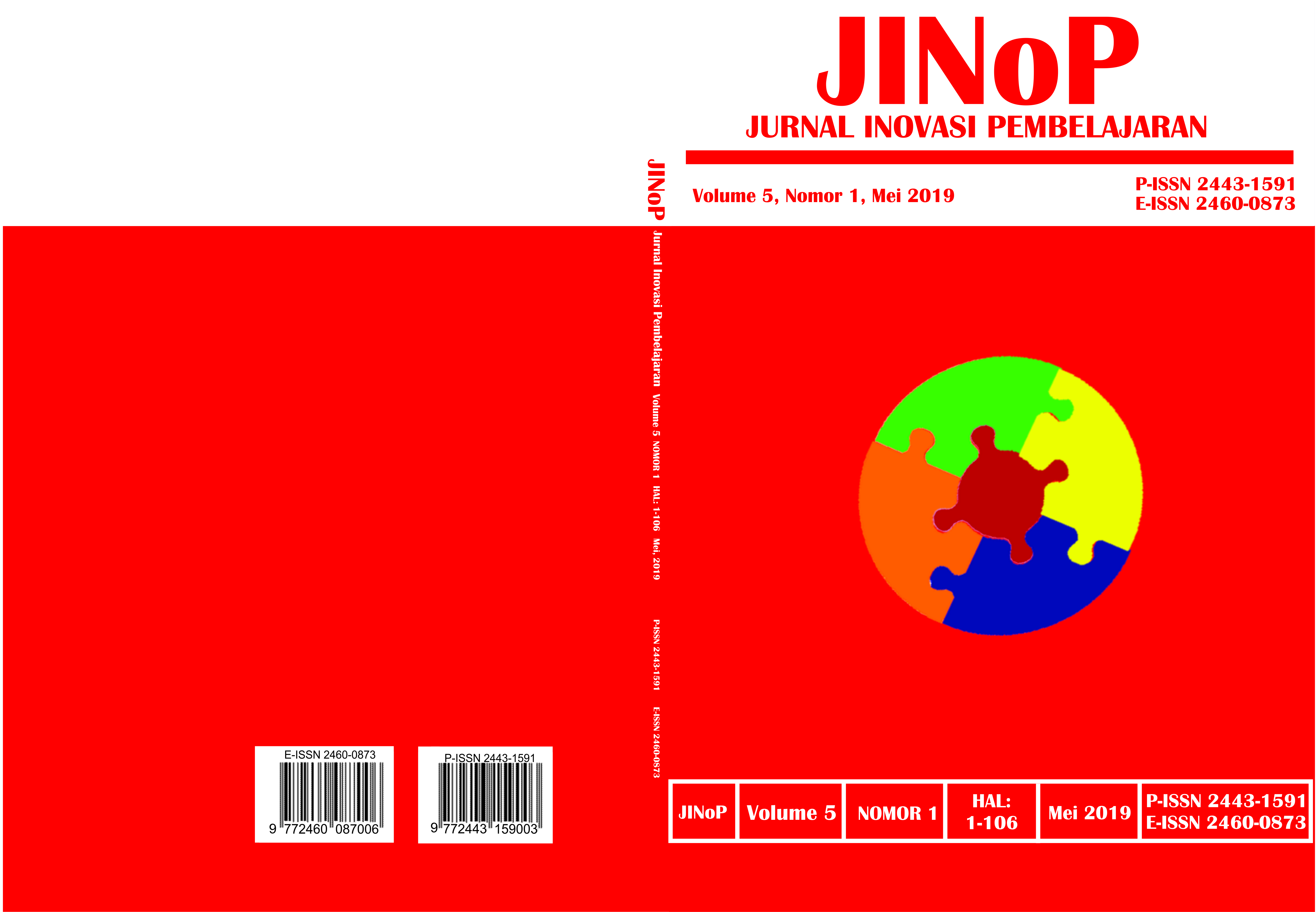PENGARUH TEKNIK MIND MAPPING TERHADAP KETERAMPILAN MENULIS PUISI SISWA SEKOLAH DASAR
DOI:
https://doi.org/10.22219/jinop.v5i1.6934Abstract
Abstract. This research is motivated by the low writing skills of poetry. This is characterized by students' poetry writing skills that are not productive, still informative, students are still difficult to express their ideas, and are less attractive to students because they only use one technique. One learning technique that can improve poetry writing skills is mind mapping techniques. Mind mapping is also a learning technique to stimulate students' imagination in generating ideas, recording and summarizing using mind mapping. This study aims to examine the effect of Mind Mapping Technique on Poetry Writing Skills of students in elementary school.
This study was an experimental study of Quasi Experimental Design with Nonequivalent Control Group Design. The population in this study were all fifth grade students of class V. Sampling is done by saturated sample technique (total sampling), namely VB class as an experimental class and VA class as a control class. The experimental class consisted of 34 students and the control class consisted of 36 students. The instrument used to determine the effect of mind mapping techniques is observation and documentation. The experimental class was treated by using mind mapping techniques in poetry writing skills while the control class without using mind mapping techniques.
Based on the results of the pretest obtained the average value of the experimental class 60 and the average value of the control class 64.2. From the results of the comparison of the two sample classes, there was a difference in value of 3.7, so it can be concluded that there is no significant difference between the two pretest grades, meaning that the two classes have the same initial ability. Next, learning was conducted using mind mapping techniques in the experimental class and learning without mind mapping techniques in the control class. After learning is given then in both classes posttest is conducted. For the experimental class obtained an average value of 82 and for the control class obtained an average value of 77.5. From the results of testing hypotheses with a significant level of 0.05 obtained a significant value of 0,000 because sig. <α, the hypothesis is accepted, so it can be concluded that there is an effect of using mind mapping techniques on students' poetry writing skills in elementary school.
Keywords: Mind Mapping Techniques, Writing Skills, Poetry
Downloads
References
Astari, R. W. (2010). Peningkatan Kemampuan Menulis Puisi Dengan Model Pembelajaran Mind Mapping Pada Siswa Kelas X Sma Negeri 1 Gemolong Tahun Ajaran 2009 / 2010. (Doctoral Dissertation, Universitas Muhammadiyah Surakarta).
Buzan, Tony. (2013). Buku Pintar Mind Map. Jakarta : Gramedia Pustaka Utama.
Departemen Pendidikan Nasional. (2006). Kurikulum Tingkat Satuan Pendidikan. Jakarta : Depdiknas.
Dewi, R. (2016). Keterampilan Menulis Puisi Melalui Metode Peta Pikiran (Mind Mapping) Pada Siswa Kelas VII E SMP Negeri 16 Surakarta.
Fitri, R. (2018). Perbedaan Penggunaan Pendekatan Kooperatif Tipe Round Table dan Write Around terhadap Kemampuan Menulis Teks Cerpen. Jinop (Jurnal Inovasi Pembelajaran), 4(1), 81-89.
Istarani. 2014. 58 Model Pembelajaran Inovatif. Medan : Media Persada.
Purnama, M. M., Djuanda, D., & Subarjah, H. (2017). Penerapan Pendekatan Proses Dalam Meningkatkan Keterampilan Menulis Karangan Sederhana Berdasarkan Gambar Seri Siswa Kelas III SD Negeri Panyingkiran Iii. Jurnal Pena Ilmiah, 2(1), 1591-1600.
Puspita, O. W. (2017). Upaya Meningkatkan Keterampilan Menulis Geguritan Berdasarkan Cerkak Melalui Penerapan Metode Mind Mapping (Peta Pikiran). Jurnal Ilmiah Lingua Idea, 6(2), 98-113.
Purwanti, E., Prihanta, W., Muizzudin, M., & Permana, F. H. (2018). Penerapan (STAD) Dipadu Dengan Mind Mapping Berbasis Lesson Study Untuk Meningkatkan Motivasi Dan Pemahaman Konsep Siswa Klas IX Di SMP Muh. 6 Malang. Jinop (Jurnal Inovasi Pembelajaran), 4(1), 26-34.
Putri, W. L., & Widihastrini, F. (2014). Peningkatan Keterampilan Menulis Puisi melalui Metode Mind Mapping dengan Media Audiovisual. Joyful Learning Journal, 3(2).
Ramadhan, Y. S., Asri, Y., & Arief, E. (2018). Pengaruh Teknik Mind Mapping terhadap Keterampilan Menulis Teks Eksposisi Siswa Kelas X SMA Negeri 1 Kecamatan Hiliran Gumanti Kabupaten Solok. Pendidikan Bahasa Dan Sastra Indonesia, 6(2), 416-421.
Resmini, dkk. (2007). Pendidikan Bahasa & Sastra Indonesia di Kelas Tinggi. Bandung : UPI Press.
Sugiyono. (2012). Metode Penelitian Pendidikan (Pendekatan Kuantitatif, Kualitatif, dan R&D. Bandung : Alfabeta.
Sukma, E. (2007). Peningkatan kemampuan menulis puisi siswa Kelas V SD Negeri Sumbersari III Malang dengan strategi pemetaan pikiran. Diksi, 14(1).
Taufina. 2015. Keterampilan Berbahasa dan Apresiasi Sastra Indonesia di SD. Padang : Sukabina Press.
Downloads
Published
How to Cite
Issue
Section
License
Copyright Notice
Authors who publish with JINoP (Jurnal Inoasi Pembelajaran) agree to the following terms:
- For all articles published in the JINoP (Jurnal Inovasi Pembelajaran), copyright is retained by the authors. Authors give permission to the publisher to announce the work with conditions. When the manuscript is accepted for publication, the authors agree to the automatic transfer of the publishing right to the publisher.
- Authors retain copyright and grant the journal the right of first publication with the work simultaneously licensed under a Creative Commons Attribution 4.0 International License. that allows others to share the work with an acknowledgment of the work's authorship and initial publication in this journal.
- Authors are able to enter into separate, additional contractual arrangements for the non-exclusive distribution of the journal's published version of the work (e.g., post it to an institutional repository or publish it in a book), with an acknowledgment of its initial publication in this journal.
- Authors are permitted and encouraged to post their work online (e.g., in institutional repositories or on their website) prior to and during the submission process, as it can lead to productive exchanges, as well as earlier and greater citation of published work (See The Effect of Open Access).








